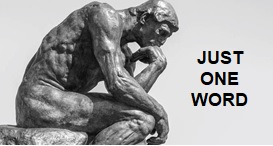Knowing yourself is the beginning of all wisdom. ~Aristotle

As I stated in my last post, emotional intelligence actually decreases as people rise through the ranks in organizations. Related to this, I read a statistic last week that has stuck in mind: 95 percent of people believe that they’re self-aware, but only about 10 to 15 percent really are. I want to give you one word that could help you move to the 10 to 15 percent.
One tool that we can all use to become more self-aware is introspection. Many leaders take time for introspection, but are they doing it effectively? Are they asking themselves the right questions?
A typical introspective question is to ask yourself, “why?” These questions can be related to our emotions. Such as, why do I dread my one-on-one meetings with employee X? The questions may be related to our behavior. Why do I get so impatient during our team meetings? Or, maybe it’s a certain attitude. Why am I so against the strategy my colleague is suggesting?
What’s wrong with asking why?
First, it puts us in a frame of mind to identify how confident we are that we are right.
Second, it simply invites unproductive negative thoughts. It puts us in the mindset to defend, instead of to learn.
The better question to ask yourself?
Simply replace why questions with what questions. When hundreds of pages of research interview transcripts with higher self-aware people were analyzed, a pattern emerged. While the word why appeared fewer than 150 times, the word what appeared more than 1,000 times.
What questions help us to stay objective, look to the future, and be empowered to take action on our learning.
Examples
You may ask yourself, “Why do I feel so frustrated?” Change that question to: “What are the situations when I feel frustrated and what do they have in common?” See what you can learn from the patterns you uncover.
Maybe you received some negative feedback and your instinct might be to ask, “Why did they say this about me?” Replace why with what and ask, “What are the steps I need to take in the future so my intentions are understood?” Be more solution oriented and less critical of past perceptions.
Asking what questions means we are willing to learn; we are leading from a growth mindset. It means we are willing to acknowledge that we don’t know everything, even about ourselves. It means leading with bold grace.